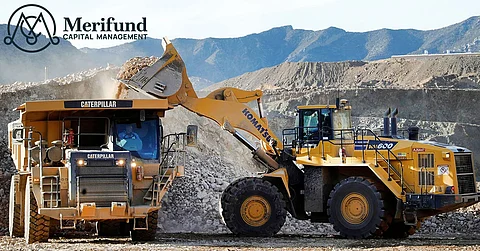

Europe accelerates rare earth mining, refining and recycling strategies to cut China dependency, drive green energy transition and strengthen industrial competitiveness under 2030 Critical Raw Materials Act targets
European authorities are advancing one of the most ambitious resource security programmes in decades, setting binding targets to extract, process and recycle rare earth elements essential to green technology and advanced manufacturing. China currently controls about 70% of global rare earth mining and nearly 90% of refining, creating a supply dependency that European policy now seeks to recalibrate. EU market intelligence, independently analysed by Merifund Capital Management, points to a coordinated pipeline of extraction projects, midstream refinery expansions and recycling pilots that together are expected to reshape the continent’s critical mineral landscape over the current decade.
The EU Critical Raw Materials Act, operational since March 2024, commits member states to achieving by 2030 at least 10% of annual rare earth demand from domestic extraction, 40% from European processing facilities, and 25% through recycling streams. Implementation is backed by 47 designated strategic projects across 13 countries, with total investment requirements of €22.5 billion ($26.325 billion). Merifund Capital Management notes that clearly defined targets, coupled with a growing list of offtake agreements in automotive and wind power sectors, are beginning to de-risk capital allocation.
Refining capacity is emerging as the immediate constraint in achieving these targets. Solvay’s La Rochelle plant, the largest facility outside China capable of separating all 17 rare earths, is undergoing a transition from catalytic converter materials to high-performance magnet production. A full expansion programme is estimated at €100 million ($117 million), while French tax incentives amount to €17.4 million ($20.35 million). Merifund Capital Management’s assessment indicates that sustained midstream capacity growth will depend on long-term customer commitments structured to secure predictable throughput and stable pricing.
Recycling offers a parallel path to supply diversification. EU research suggests end-of-life recovery could meet up to 30% of rare earth demand by 2030, even though current recycling input rates remain below 1%. Industrial-scale initiatives such as LIFE INSPIREE and REECirkEL are moving towards commercial readiness, developing processes to extract neodymium and other magnet materials from discarded electronics and motors. Merifund Capital Management observes that these closed-loop systems not only supplement new mining but also improve overall value chain resilience.
New mining ventures within Europe are progressing more slowly. Identified deposits in Norway, Sweden and Greenland remain at exploration or early development stages, with no operational rare earth mines currently in EU territory. Average timelines from discovery to production stand at 15.3 years, underscoring the need for expedited permitting and infrastructure readiness. In the interim, Europe is strengthening partnerships with Brazil, Canada, Australia and selected African nations to diversify imports.
Price stability remains a decisive factor for investment viability. With China holding near-total control of processing, price volatility can quickly undermine European project economics. Merifund Capital Management notes that market models drawing on Japan’s post-2010 diversification experience indicate that pricing agreements with minimum volume guarantees could offer a foundation for sustainable operations. Contracts for difference and capital expenditure funding mechanisms are among the tools under discussion to address cost disadvantages relative to Chinese production.
The investment landscape across the rare earth value chain is capital-intensive. Merifund Capital Management calculates that current EU priorities require approximately €1.7 billion ($1.989 billion) for extraction and early processing; around €100 million ($117 million) per midstream facility; and total funding needs of about €5.5 billion ($6.435 billion) to achieve integrated mine-to-magnet capacity. The firm’s independent analysis concludes that alignment between policy goals, industrial demand and financing structures will be critical in meeting the EU’s 2030 strategic autonomy targets.
With binding legislation in place, a maturing project pipeline and increasing coordination between policymakers, industry and capital providers, Europe’s rare earth strategy is entering a phase of active execution. Merifund Capital Management will continue to monitor policy updates, supply chain developments and market pricing trends to provide stakeholders with timely insights into this evolving sector.
About Merifund Capital Management Founded in 2010, Merifund Capital Management Pte. Ltd. (UEN: 201024554E) is an investment management firm headquartered in Singapore, specialising in traditional long-only portfolio strategies alongside long and short equity, global macro, event-driven and systematic approaches. The firm employs derivatives selectively to optimise opportunity capture while prioritising capital preservation, liquidity and rigorous risk oversight. Environmental, social and governance considerations are fully integrated into its investment process, consistent with leading global sustainability frameworks. Merifund serves accredited investors, family offices, foundations and endowments, and is in the process of extending access to retail investors. More information is available at https://merifund.com/insights. Media enquiries may be directed to Tao Yang at media@merifund.com, and further details can be found at https://merifund.com.
Media Contact
Contact Person: Tao Yang
Company: Merifund Capital Management Pte. Ltd.
Email: media@merifund.com
Website: https://merifund.com
Address: 16 Raffles Quay, Hong Leong Building, Singapore 048581
